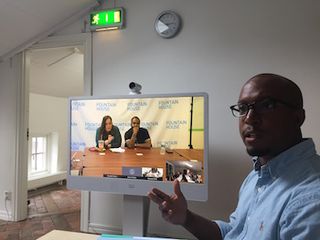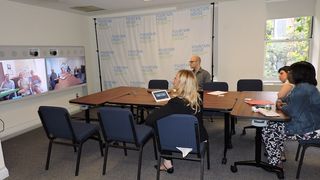- When Fountain House, a community-based organization dedicated to the recovery of men and women with serious mental illness, determined that education was the best way to support the expansion of the clubhouse movement across the globe, they called upon IVCi to deliver the videoconferencing needed to share their proven methods with other programs that follow its model of mental health recovery. To support the success of Fountain House model programs worldwide, the Learning Exchange was launched to overcome the geographical limitations of providing onsite training by building a technology infrastructure for delivering anytime, anywhere training and support for clubhouses. As a result, Fountain House is now closer to achieving its ultimate goal: to enable all adults living with mental illness the ability to gain confidence and control of their lives by connecting them with access to a quality clubhouse, regardless of where they live.
Over the past 40 years, hundreds of programs around the world modeled after Fountain House have opened their doors. While some programs see great success, many struggle and close, while others continue to operate, but provide subpar services. This disheartening cycle has resulted in a virtual halt to the growth of the movement. More support for the nascent clubs was needed to break this pattern if Fountain House was to achieve its ultimate goal. Also, in the past, training was only provided onsite in a handful of locations, and generally in English-only formats, so travel expenses and language barriers kept many distant affiliate clubs from attending. It became apparent that to achieve their expansion objectives, Fountain House would need to develop a cost-effective method of delivering ongoing support regardless of geographic location and home language.
After deciding that videoconferencing would be used to overcome these limitations, adoption of the technology by members and staff presented a challenge. Since many of them were new to collaboration, they had to get comfortable with how to set up and use the equipment to maximize the benefits of using their solution. Typical of every new installation, knowledge retention was another issue. If the technology wasn’t used every day, the training would be forgotten, or if there was a change of staff or new members, they would need to learn how to use it, too. Also, since the staff and members at the affiliates had very little IT expertise, the amount of assistance needed to support the entire network of clubhouses was yet another obstacle. Then, there were language barriers when trying to support the international clubhouses.
When Fountain House became a recipient of the 2014 Conrad N. Hilton Humanitarian Prize, they now had the means needed to make modifications to support the growth of their movement. This generous grant is awarded to organizations judged to have made an extraordinary contribution toward alleviating human suffering; Fountain House was chosen for its outstanding work with the mentally ill not just at its program on 47th street, but worldwide. Therefore, it was decided to direct funds from the grant toward building the Learning Exchange—a new educational network utilizing video conferencing to connect clubhouses.
“Fountain House determined the award should be for the greater movement,” said Lisa Kessler, training coordinator, Fountain House. “Alan Doyle, Ed.D, the director of the Center for Leadership and Education, is a true visionary. He identified that education was the only way we could successfully support more clubhouses worldwide. Then, after lots of discussion, we decided to engage IVCi to provide the collaboration solutions needed to deliver training and ultimately create more great clubhouses throughout the world.”
By partnering with IVCi to create the Learning Exchange, an infrastructure was created for Fountain House to support new clubhouses utilizing educational interventions. But, that’s not all. It also enabled Fountain House to partner with other successful, established clubs to “give back” to the cause by providing regional training to other less established or struggling programs in their own state or country. Using technology to decentralize support, IVCi built a scalable model for delivering education, enhancing the broad expansion of the Fountain House model. Now, the program has the ability to grow exponentially.
The Learning Exchange is built on a worldwide network of videoconferencing units. IVCi chose the following core technology for each of the Fountain House affiliates: a Cisco SX10 codec, Cloud Video Experience (CVE), and Cisco WebEx. This solution ensures a positive experience every time. By using the SX10 video endpoint with WebEx, clubhouses are guaranteed to have high quality audio and video on each call. Also, with CVE, a collaboration service with a quality global network, calls are secure and the network connection is always optimal. Consistency in the user experience across all club locations, an easy-to-use interface for calling and sharing content, and the ability to connect with anyone were key factors in selecting this solution.

Communities apply to Fountain House to participate in the program. They must define their project and commit to supporting the growth of the movement. Upon acceptance, Fountain House provides the hardware (a Cisco SX10 codec) and the software (CVE and Cisco WebEx) for the first year. Participants can apply annually for continued financial support or can take over the ongoing costs (CVE and maintenance) themselves. Fountain House also acts as the point person for technical assistance between participant clubhouses and IVCi.
IVCi installed the first solution in the Bronx at a sister clubhouse; members and staff were trained on how to activate and connect the SX10 and configure CVE. A second training was provided on how to use Cisco WebEx. In this session, Fountain House staff and members learned how to schedule, join meetings from various devices, record meetings, make annotations, and share content.
“The goal of IVCi’s training was to make sure Fountain House got maximum value from its investment by ensuring they used the technology to its fullest extent,” said Evan Stein, sales engineer, IVCi. “IVCi was very flexible with training and assisting with installations and remote activations. Although the sessions were originally intended for four to five attendees, about 25 actually came. The rooms were bursting with enthusiasm and there were lots of really lively and interactive discussions.”
For knowledge retention, training videos were also provided by IVCi, so if a refresher is required or someone is new to the organization, they can view recordings on installing an SX10 or using WebEx. To enable IVCi to provide assistance at any time, Live Video Assist (LVA) is always available to staff and members at Fountain House and any of the clubhouses. With a single click from an app, they can have an interactive video session with an IVCi Help Desk technician and get whatever help they need. Also printed and laminated Quick Reference Guides were provided by IVCi and kept with the videoconferencing equipment.
“To guarantee adoption, IVCi took the time to make sure staff and members at Fountain House and its affiliates were comfortable with the technology we provided,” said Tom Pisarczyk, IVCi’s project manager. “Now, they are able to install and train their own staff on using WebEx and CVE. We also left behind handouts to keep with the equipment to make sure anyone entering the room had immediate access to helpful instructions.”
With the growth of the movement occurring around the world, many non-English speaking staff and members from international affiliates are challenged with getting the training and support they need directly from Fountain House. The technology infrastructure built by IVCi addresses this also. By using videoconferencing to tap into the large, growing network of clubhouses, it is often possible to partner a thriving club with a struggling one. “We had a new affiliate club in Poland with non-English speaking members and staff that Fountain House just couldn’t help alone,” said Kinga Jedrzejczak, partnership coordinator, Fountain House. “So, using the Learning Exchange, we were able to connect them with Polish speakers from a successful clubhouse in Stockholm, Sweden.” This proves the program is working. The movement now has the ability to rapidly expand because technology is in place to overcome communication problems imposed by language barriers and training issues constrained by physical locations.
According to the World Health Organization (WHO), people living with serious mental illness have a life expectancy that’s 10-20 years shorter than average. Fountain House has teamed up with WHO to put an end to this disparity. With the Learning Exchange, videoconferencing technology is now used to dramatically improve the number of affiliate clubs supported worldwide, so the Fountain House model can reach more people in need, and ultimately improve the quality and, hopefully, the longevity of their lives. Since the launch of the Learning Exchange, more and more adults all over the world living with mental illness have access to quality clubhouse programs. As this number steadily increases, Fountain House is well on its way to achieving its ultimate goal: to provide every adult living with mental illness more confidence and control of their lives by connecting them with quality clubhouses.

